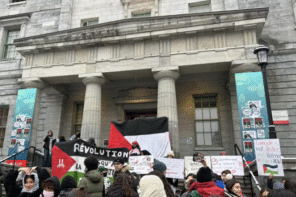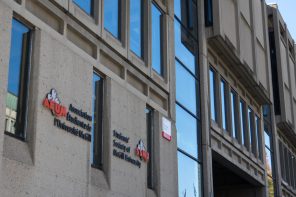On March 14, SSMU Legislative Council convened with a full agenda of reports and motions to discuss. The Council approved numerous motions pertaining to student fees, an affordable student housing plebiscite, and internal regulations of student groups, among others.
Student Services Fee Question:
A significant portion of Thursday’s meeting was dedicated to the Motion Regarding the Student Services Fee Question for Winter 2019 Referendum. Martine Gauthier, Executive Director of McGill Student Services, attended Thursday’s meeting to give a presentation outlining what a fee increase – or lack thereof – would mean for student services going forward. Council ultimately passed the motion with nineteen in favour, five opposed, and one abstention, therefore approving the student services fee question for the upcoming referendum period.
If students vote in favour of the question in referendum, the revenue raised from the increased student fee would total over three hundred thousand dollars. This amount would cover the salaries for three general mental health counsellors and half the cost for the trauma counsellor, according to Gauthier. Overall, the fee goes towards mental health and wellness services that the upcoming Rossy Student Wellness Hub will provide.
Gauthier acknowledged that the Council had previously voted down the motion at their meeting on February 28, therefore not approving the student services fee question for a school-wide vote. She encouraged Council to reconsider approving the question for the upcoming referendum period, insisting that “students are entitled to a fair vote.” With this in mind, she also warned that there will be repercussions if students vote against the increased student services fee, stating, “We have to talk about what services and what programming you identify as non-essential if the referendum doesn’t pass.” She ultimately labelled her presentation as a “reality check.”
The motion confirms that if the referendum goes through, the University will match the approximately three hundred thousand dollar student fee contribution for student services. During the debate period, Councillors expressed concern about the conditional nature of the motion, which states that McGill will only provide these funds for student services if the referendum question passes.
Senator Andre Lametti felt that Council should vote against allowing the question to go to referendum. He criticized the University for withholding funds that are available, as evidenced in the motion, and for its unwillingness to contribute to student services unless students vote in favour of the fee increase. He asserted, “It’s a way for the administration to create a false dichotomy by saying, ‘If you want more services, you have to pay for it, and if you vote this down you’ll have less services.”
Senator Bryan Buraga echoed Lametti’s sentiments, saying, “It just leaves a bad taste in my mouth for McGill to dangle three hundred thousand dollars over our heads… McGill has the money to increase student services if they find it to be a priority. And what this tells me is that McGill doesn’t find McGill student services a priority.”
Several members of Council spoke in favour of passing the motion while continuing to advocate for students. Victoria Flaherty, Clubs Representative, entertained the possibility of convincing the Deputy Provost to contribute the upwards of three hundred thousand dollars regardless of the question results.
Vice President University Affairs Jacob Shapiro agreed with Flaherty, stating, “Regardless of what happens with this vote, we have the option to go advocate on behalf of the students.” He encouraged Council to pass the motion due to the tangible benefits it will have for students’ wellbeing, but retained that they should still advocate for students by negotiating with the administration.
Fall Reading Week Question:
Senator Bryan Buraga and JED Consultant Bryan Jay presented the Council with the recent survey results regarding a potential Fall Reading Week. The data indicated that, of the feasible options presented in the survey, the majority of students were in favour of an earlier start to the Fall semester, either before Labour Day but still within the month of September, or in late August.
While most students indicated that starting classes in August is an acceptable sacrifice, some highlighted financial concerns that would arise if they could not sublet their apartments for the month of August. The committee is working to reconcile students’ financial concerns with the necessity of executing a fall break.
The survey found that students’ mental health was by far the most crucial factor signalling the need for a Fall Reading Week. Eighty-three percent of students who took the survey strongly agreed that a Fall Reading Week would allow them to take care of their mental health by catching up on class material, spending time with friends and family, and reintroducing healthy habits. According to Buraga, the best case scenario for scheduling the first Fall Reading Week would be in Fall 2020. A referendum question regarding a Fall Reading Week will be presented next month.
SSMU Master Plan and Associated Fees:
President Tre Mansdoerfer gave a presentation on the SSMU Master Plan, which included a Motion Regarding the Increase of the SSMU Membership Fee. He prefaced by admitting that he was disappointed in SSMU’s overall inaction and lack of tangible progress in his first three years at McGill. Now in his fourth year, he hopes that this Master Plan will allow student government “to take on something that’s bigger than SSMU,” and make large, tangible improvements for the Society in coming years regardless of inevitably changing Executives and teams.
One of the primary goals of the Master Plan is to remedy the lack of a central student hub on campus and ease overall space constraints that have limited SSMU’s impact. The proposed SSMU Membership Fee increase would allow for future renovations to Gerts and the second-floor cafeteria in the SSMU building, making both more conducive to student life activities. Ideally, renovations to Gerts would make it more fitting for events and as a student hub, while the second-floor cafeteria would adopt a “financially viable” food court model with various food vendors.
The Master Plan also includes SSMU purchasing additional buildings around McGill in coming years and turning the already acquired 3501 Peel building into a student wellness center. Mansdoerfer pointed out that “we’re now two-hundred thirty clubs and sixteen services, and we have the same space available as sixty years ago.” The funds from the increased membership fee would help SSMU accumulate property and make more space for operations, clubs, and services.
Several Councillors expressed concerns over the seemingly drastic fee increase and students’ inability to opt out of the fee. In response, Mansdoerfer iterated his belief that the fee should not be opt-outable as it encompasses operations and important services that directly benefit SSMU members. He acknowledged that the increase is steep, but because there has not been a significant base fee increase since 2007, the new fee increase would bring SSMU back up to speed. The motion ultimately passed with nineteen in favour, three opposed, and three abstentions.








